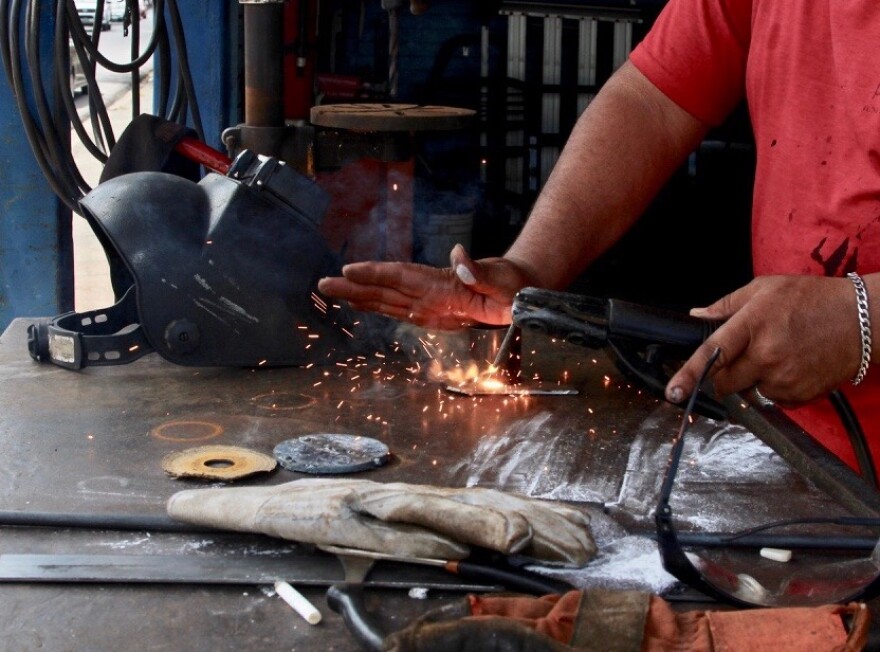In Nicaragua, hundreds of people are dead and hundreds in jail for opposing the government.
The chaos in Nicaragua has prompted Vermont Democratic Sen. Patrick Leahy and Texas Republican Sen. Ted Cruz, two otherwise polar opposites politically, to work together to craft sanctions against Nicaragua.
More from VPR — For One Nicaraguan Man, Vermont Provides A Haven As Crisis Spirals At Home
Since April 19, 2018, calls for change by unarmed marchers have been met by tear gas, stun grenades and bullets fired by police and government paramilitaries.
In addition to the more than 300 people who have been killed since April, hundreds more are now jailed as political prisoners, branded by the Sandinista government of President Daniel Ortega as terrorists for daring to participate in vocal but unarmed protests against repression.
One of them was 19-year-old Elsa Valle.
"We were intimidated every day and it continues now,” she said in Managua, the country’s capital.

In June, Valle was with fellow university students when police burst in. She was driven to El Chipote, a notorious jail where human rights defenders say torture is commonplace.
She said she was brought into a room in front of machine-gun toting men and ordered to admit that the students had received arms to fight the government. She said they had not, an assertion supported by human rights lawyers.
“I could not say that because it’s not true,” Valle said.
She said she held firm, refusing to say what her interrogators wanted to hear. Valle said an armed guard outside her cell then issued this threat: “I'm going to rape you.” After that, she said guards constantly clicked AK-47 machine guns outside her cell at night.
“There was a lot of psychological abuse in jail,” Valle said.

And terror is hardly confined to prison. Willie Miranda said government thugs began harassing his family after a demonstration in southern Nicaragua.
"They were chasing us ... Phone calls, you know, 'We're going to kill you, we're going to burn your house, kill your sons,'" he said.
The Sandinista movement was supposed to be an egalitarian revolution. It came to power in 1979, overthrowing U.S.-backed dictator Anastasio Somoza. Today in Nicaragua there’s a popular slogan: "Ortega Y Somoza Son La Misma Cosa," which translates as "Ortega and Somoza are the same thing."
In an act combining punishment with revenge, thousands of people have been dispatched by the Sandinistas to take over lands owned by the regime’s opponents. Close to 17,000 acres are now under armed occupation — and you can't call the police to help you.

"The whole world [has] seen what happened here, how the human rights are being violated day-to-day,” said Michael Healy, who leads Nicaragua's Union of Agricultural Producers.
Between farmers, ranchers and their workers and families, Healy represents roughly one in three Nicaraguans.
Healy said that some of his family’s lands have also been taken over. However, he said the fate of his family’s properties are not his primary focus right now because the armed squatters are just one footnote in a mosaic of state repression.
"Unfortunately we feel that we're tied up, you know?” said Healy. “And we have to break those chains.”
U.S. sanctions are looming, and Healy said he believes the majority of Nicaraguans support them.
"If we want to get rid of this regime," he said, "we [Nicaraguans] have to pay a little price."

University of Vermont economist Emily Beam, who studies the effects of sanctions, told VPR that sanctions translate into a distinct message to financial markets.
"This action by the U.S. could indicate to private investors that Nicaragua's not a good place to invest, essentially scaring off private investment,” said Beam.
As for Valle, after three months of terror in jail, she was released in late September, without explanation. She said she's not going anywhere: "I have lost my fear after everything they have done,” she said.
She added emphatically that for all those fleeing the country, she and many others are staying to continue their struggle.





